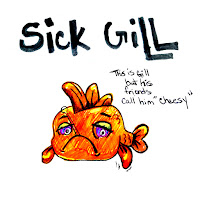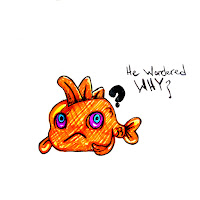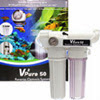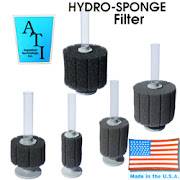By Carl Strohmeyer-PAMR 40+ years experience
Updated 5-9-23
 The purpose of this article is not to provide any specific treatment regimen for the readers fish, rather to provide an outline that will provide a better chance for success over the typical "my fish are sick and what medications & how much should I dump into my aquarium" question.
The purpose of this article is not to provide any specific treatment regimen for the readers fish, rather to provide an outline that will provide a better chance for success over the typical "my fish are sick and what medications & how much should I dump into my aquarium" question.
Obviously the starting place is aquarium disease prevention, but many readers will be too late to this aspect of fish husbandry, which is the point of this particular article.
A good professionally written article for prevention of aquarium disease is this one:
"Aquarium Disease Prevention; Proven Steps for a Healthy Aquarium"
Every single step in the above article should be followed to a T and I can guarantee that the incidence of disease will go down greatly.
Hopefully readers will acquaint themselves with this above referenced article which will in part form a basis for this article as I go forward.
As well this article is another good read before one goes forward with any fish treatment:
"Aquarium Medications; Part 1"
 I cannot emphasize more that many if not most fish diseases, especially bacterial or fungal in nature (including secondary infections to parasitic infestations) have a background issue. Failure to eliminate this background issue(s) will often result in failure of treatment.
I cannot emphasize more that many if not most fish diseases, especially bacterial or fungal in nature (including secondary infections to parasitic infestations) have a background issue. Failure to eliminate this background issue(s) will often result in failure of treatment.
Often the "background issue" is more than half the problem, so a good part of the treatment plan is REMOVING this background issue!!
A good analogy I like to use as to why it is so important to eliminate these issues is this:
"Not correcting causes or background issues is akin to standing in a burning building asking for a treatment for burns, while not leaving the burning building"
 Unfortunately in my dealing with questions of what one should treat for a given set of symptoms, I have found that for the majority of these questions, the person asking the question either only addresses underlying issues in part or not at all.
Unfortunately in my dealing with questions of what one should treat for a given set of symptoms, I have found that for the majority of these questions, the person asking the question either only addresses underlying issues in part or not at all.
Often this is not because the person does not want to, but they simply do not have the means or the availability for whatever reason to do so.
I would also point out, and while this may seem a bit harsh, it is still the reality, and that is this is still not a valid excuse to continue to ask for alternative treatments or complain to persons such as myself that the treatment failed when proper procedures have not been completely followed.
I personally spend a copious amount of time writing articles, answering questions, or even paying staff to help for free, but please remember that one needs to obviously follow the medication course prescribed, but just as importantly if not more so, deal with ALL underlying causes to a given fish illness problem. So repeatedly going in circles when not following exactly advice given is in my opinion disrespectful to the person who is trying to help you with your fish illness issue.
When you are asking others for help, whether it be online or at your local fish store, make sure you ALWAYS provide background first; including ALL water parameters (mineral Cations too), filtration, maintenance, feeding, & fish kept. Past fish treatment history is important too.
I cannot tell readers how many times people have asked for my help and told me that their water parameters were OK/good, but when pressed to provide actual COMPLETE numbers or I went out personally and checked, the water parameters were anything but OK/good. Often the important KH & GH tests were missed too, partly due many well meaning aquarium keepers fooled into thinking that their "API Master Test Kit" was all they need (a symptom of shopping discounters or getting information from "cut & paste" internet articles, videos or forums).
As an analogy; your personal Doctor always has your history, takes your vital statistics, etc., so why should we expect those we are asking to help us with our sick fish to guess, especially when one considers we often are asking others to help us sight unseen and with far less tools at our disposal than a Doctor would have?
Here first are basic procedures to check off before treating any fish sickness issue:
- Make sure ALL water parameters are as they should be. This includes well known and obvious parameters as well as less obvious parameters. This is part of the "background issues I mentioned earlier.
It is also important to know the parameters of any new water used for water changes, so as to make note of any changes that might happen in the aquarium after the water is changed (in other words a baseline). As well, sometimes sudden changes in pH can cause illness in fish, so knowing the pH of new water for water changes versus old water is important.
INCLUDING:- Ammonia; under .5 ppm (best 0 or less in most circumstances)
Exposure to high ammonia in the past can be a set up for opportunistic infections in the future due to gill & organ damage (Methylene Blue baths can sometimes help with gill damage, but more so if done immediately). - Ph; stable within the generally accepted target range of the fish to be kept (if the target range is 6.5 to 7.5, stable at any number there-in)
- KH; this too can vary depending upon fish kept, but generally anywhere from 50 ppm to 150 ppm
KH (carbonate hardness) can keep an aquarium from pH crashes and knowing your KH on a regular basis can also tell you if it drops rapidly even after adding buffers that your bio load is too high and/or water changes are not adequate. A low or unstable KH can be an indicator or background issue for fungal/Saprolegnia and Aeromonas bacterial issues.
Further Reading:
Aquarium Chemistry; KH (Carbonate Hardness) - Flow and oxygen levels; most persons do not have an oxygen test kit, so having a water flow turnover rate of 5 times for an average non-planted freshwater aquarium usually will indicate adequate oxygen levels
- Bio Load & Decomposition & DOC; a high bio load, often compounded by decomposition of organic and high dissolved organic compounds will often be a breeding ground got Aeromonas and Saprolegnia. Fixing this is as important as any treatment regimen.
High Nitrates (over 40-50 ppm) can also be a symptom of this issue too.
Further Reading;
*Bio Load in Aquarium or Pond
*Aquarium Nitrates - Redox and Mineral Cations; this is an aspect of fish care that continued research both in and out of the hobby/industry is proving to be key.
In diseases such as Columnaris, having a less than optimum Redox whether it be the electromagnetism of the water, missing mineral Cations, low water rH, low or non existent GH, or simply too many free radicals (oxidizers) making for an unbalanced Redox; this is a major aspect in whether you will be successful in treating or just as importantly not have this disease present in the first place (since it is an opportunistic infection).
Other diseases such as HLLE have a direct relation to Redox (or a Redox quality/balance measurement called Relative Hydrogen aka rH). In freshwater, rH should be 23 to 26, otherwise your aquarium may not be as conducive to good health as it could be.
As well GH is a measurement many forget the importance as it has a direct relation to osmoregulation, mineral Cations, Redox & more. For most FW aquariums your GH should be at least 150 ppm, but much higher is still OK and with some fish such as livebearers, puffers, Lake Malawi Cichlids and more; a higher GH is called for.
Further Reading; Aquarium Redox - Temperature & Temperature History; sudden or even gradual but pronounced swings in temperature can have a major impact on a fish, often with permanent internal organ damage that can lead to opportunistic infections that may not be curable due to slow organ failure.
An example would be a fish such as a Betta exposed to 90F plus temperatures, this can result in permanent organ damage such as to the kidneys.
- Ammonia; under .5 ppm (best 0 or less in most circumstances)
- Follow ALL professional based treatment regimens when you treat for a disease.
This includes full dose of medications for the recommended days, any baths, swabs or similar if required, increased or decreased water temperatures if required, and use of sodium chloride salt if required (as an example, the last two are required for Columnaris treatment).
This also includes synergistic combinations such as Kanamycin WITH Nitrofurazone for Columnaris and other infections. Using just one or the other as per many professional recommendations is a recipe for failure.
In other words, if a fish bath, dip, or bare isolation/hospital tank is called for in the treatment regimen, this should be used, otherwise do not expect optimum results.
A common medication mistake is using "first aid" treatments such as Melafix for full blown infections, this is analogous to using Neosporin for a staff infection in a human. Then some will make very uninformed statements that "Melafix killed their fish".
Reference: Melafix Dangers; Betta, Labyrinth Fish, Pencil Fish
Another common mistake is using medications that likely not effective for the issue at hand. A common medication here is Metronidazole.
This is an excellent medication when used for what it is called for, but for some reason of late it is commonly used (sometimes in combination products such as General Cure) for fish diseases that are likely deterioration most likely caused by common aerobic gram negative bacteria commonly found in the aquarium and/or "bio filter". Problem is, Metronidazole is most effective with anaerobic gram positive & some anaerobic gram negative bacteria.
Further Reading:
Aquarium Answers article about Fish Baths - Follow ALL recommended fish husbandry aspects of fish care, including water changes, good filtration (including true germicidal filtration), proper mineralization, feeding, even optimal tank size, tank mates and places to hide from aggressive tank mates (example would be a small Mbuna/African Cichlid aquarium with little rock structures for weaker/submissive fish to escape, which can result in stressor that allow a disease such as Columnaris to get a foothold and then even spread to stronger fish in this aquarium).
I have addressed this in part in the overview section of this article, but since optimal aquarium conditions are one of the key aspects of most ALL fish disease treatments, I will note this again and expand a little more on it.
A common line I hear from well meaning aquarium keepers or even well meaning persons giving advice is: "Yes, my water conditions are good, I feed a good fish food, & I used what you stated".
Then I dig deeper and I find out that only part of a treatment is followed, they did not maintain a stable KH, proper mineralization and Redox, and what they assumed was a good fish food is what the person at PetsMart told them was best or they purchased from a large online marketer such as Amazon.
Even if a person has a UV Sterilizer, it often turns out to be just a Clarifier such as a "Green Killing Machine" or the many HOB UV filters they purchased on Amazon that might be great for green water, but does little to address disease prevention.
I cannot emphasize more the reading of these articles:
*"Aquarium Disease Prevention; Proven Steps for a Healthy Aquarium"
*"Aquarium Redox Balance"
*"Aquarium UV Sterilization; Facts & Information"
*"Fish Nutrition" - Consider an online fish care forum that is based on honest researched information, healthy interaction/discussion; and with members that are NOT about popularity and insulting others while lacking true/honest moderation. As well many forums have members and Admins that rarely read experience/researched information that is simply passed around like the telephone game often resulting in inaccurate information being given.
A forum that thinks Amazon is the answer to all your aquarium needs is one to be avoided, especially since many of the best treatments cannot be found here (along with many of the best aquarium products such as UV Sterilizers). It is also noteworthy, that by shopping Amazon, this only hurts professional sellers that support true information websites such as this one.
Here are our suggestions for sick fish care & prevention (the first two are the best places to reach aquarium fish keeping guru Carl Strohmeyer):
HERE IS AN EXCELLENT VIDEO ABOUT THE BEST AVAILABLE TREATMENTS:
AAP Professional Aquarium & Pond Medications
ADVERTISEMENT
Next, here are causes for failure of any fish illness treatment regimen:
- My first thought here is to point out that even a Medical Doctor with her/his years of college and later internship and experience along with the medical equipment and test at her/his disposal cannot cure everything, but not addressing underlying issues only complicates any human medical treatment further.
An analogy here is a patient who asks the doctor why he/she had a heart attack at only 42 years old, but fails to recognize the doctors advice that he/she is obese and needs to stop eating a Big Mac burger for breakfast, lunch, & dinner.
Unfortunately, many aquarium keepers will always start with medications or be advised as such (which of course medications are important), however your starting point should ALWAYS be water parameters & diet that provide optimum fish osmoregulation, as little oxidative stress, and as clean as possible water (not over cleaning whereby you wipe your bio filter either).
Quoting from a Doctor who works with refugees whom I just listened to a talk from; He noted many are trained to administer Metronidazole to refugees suffering from malnutrition, and severe dehydration resulting in life threatening diarrhea. He stated world health practices has found this to be totally wrong!
He noted that first get fluids and osmotic balance/electrolytes, and most often the patient will recover without Metronidazole and only administer Metronidazole after recovering the patient from the diarrhea.
DITTO YOUR FISH!
The other aspect of this bullet point is even is you were to follow everything correctly, have all the resources possible, and remove underlying causes; success is NEVER guaranteed. - Failure to follow medication treatment regimen or substitutions for what ever reason.
This is very common cause of failure.
Examples of failure to follow instruction include using just Kanamycin when the synergistic blend of Kanamycin and Nitrofurazone are called for to treat infections such as Columnaris. OR often even when blended, often aquarium keepers will utilize the less effective Furan 2 which calls for a different treatment schedule, when a better blend with AAP's Yellow Powder/Premium Nitrofurazone is the better choice (AAP Yellow Powder/Premium Nitrofurazone generally only requires the one initial treatment with Kanamycin followed by 2-3 more Kanamyacin/Kanaplex treatments).
Either one or the other will generally result in failure!
Or another example is if a Medicated Wonder shell is needed in addition to the above noted combination example to lower oxidative stress for a serious multi-pathogen or unknown issue, the chance of success on a likely difficult situation will be lower.
Reference: "Aquarium Medications; Part 1"
Product Resources:
* AAP Yellow Powder/Premium Nitrofurazone
* AAP/SeaChem Kanaplex (Please support this article and the professional aquarium keeping industry/hobby by purchasing here rather than discounters such as eBay and Amazon)
* AAP Premium Wonder Shells; (the ONLY Authorized full-line online retailer with the freshest product, unlike clearance product sold elsewhere including Amazon. Like a battery, Wonder Shells loose their Cation charge over time, so purchasing cheap/clearance product is not wise) - Similar to the above is taking advice from multiple sources/people.
The problem with trying to blend multiple different advice methods into one treatment is these are often conflicting and could result in over medication. This is NOT to say there is only one way to treat a specific problem, but I can state from decades of experience and client sick fish calls that combining treatment methods often results in failure!! - Genetics & poor breeding.
This is more common than many know, especially with fish such as Betta and goldfish which are heavily inbred for certain attributes with fish physiology be damned, thus resulting in very genetically weak fish (think about how many pedigree dogs are also over bred). - Poor care such as over crowding with resulting high ammonia exposure at some time in the life of the fish resulting in permanent organ damage that makes a fish susceptible to disease and treatment difficult later in life.
This is common with carnival goldfish, but again common with Bettas in how they are shipped and kept right up to their purchase.
As noted in the first section, as to following ALL optimal husbandry practices, when this is not done this can make a treatment less effective or not effective at all.
Often the result is that a more mild treatment regimen that WOULD WORK IN OPTIMAL CONDITIONS will not work, while a strong, sometimes harsh treatment, still will work. Then anecdotal observations that treatment A does not work while treatment B does, when in reality using more scientific method, we find this observation is not true by virtue that that treatment A was not given a fair chance to succeed via better fish husbandry standards.
I have seen this incorrect observation in social media as per ParaGuard versus Quick Cure for Ich treatment or General Cure versus Levamisol for worm treatments (the first in each example representing the more mild treatment). - Poor Diet.
This also does not need to be a current poor diet, it can be a past poor diet and in fact generally is since diet issues rarely show up immediately.
Diet issues include renal (Kidney) failure due to incorrect or poorly optimized protein levels, too low fiber, and fatty liver disease from too high of energy levels again instead of optimum levels (optimum is 280 energy points).
These are unfortunately quite common as even most of the best of fish food diets that use top notch ingredients do NOT optimize! This is even a bigger problem with most common fish foods fed.
A few examples as per exceeding optimum energy levels are: New Life Spectrum at 329, Cobalt Fish Foods at 420, and Wardleys' at a whopping 501 energy points!A seemingly contradictory point is that while long term fish health is provided by fish foods with low energy levels and higher fiber content, fish foods that are pre-digested and higher in energy levels is often best while treating sick fish. A good example here would be AAP/Gamma NutraShots which can be thought of as a frozen food that does not need to be frozen and stimulates natural feeding behavior.
 Unfortunately once the fish is sick due to past poor diets, even improved diets often cannot correct the issue, thus resulting in failure of treatment. This is especially true for Dropsy and other causes of bloating and even for Columnaris.
Unfortunately once the fish is sick due to past poor diets, even improved diets often cannot correct the issue, thus resulting in failure of treatment. This is especially true for Dropsy and other causes of bloating and even for Columnaris.
Reference: Fish Nutrition
Recommended Fish Foods:
*AAP Custom Premium Optimized Fish Food
*AAP Spirulina 20
*AAP/Gamma NutraShots
Other Recommended Reference & Product Sites
THE PREMIUM Aquarium Sponge Filter with as much as 5 TIMES the bio and mechanical capacity of commonly sold Chinese knock offs!!
Definitely worth the extra $1-3
 UV Replacement Lamps/Bulbs; Aquarium or Pond
UV Replacement Lamps/Bulbs; Aquarium or Pond
For TRUE High Output, Hot Cathode, Low Pressure UVC Germicidal Bulbs, for aquarium or pond
PUR or RQE, YouTube Video Fail- Guide to lighting a planted tank
AquaRay Ultra Premium Aquarium LED Lights
Highest in PUR, The ONLY LED with an IP67 rating or higher for water proofing along with a full 5 year warranty to back them up!
Why purchase brands without this rating such as the Finnex, Current, or Fluval only to be essentially placing an electronic light emitting device over your humid aquarium with little or no guarantee? In the long term, you WILL PAT MORE!
TMC V2 RO Filter systems; the very best you can buy with TDS meter (far superior to 4 stage RO/DI systems sold via Bulk Reef Supply, Amazon, or eBay that use the inferior cellulose triacetate membrane made by Dow):
 Reverse Osmosis Aquarium Water Filters; with TDS Meter
Reverse Osmosis Aquarium Water Filters; with TDS Meter






